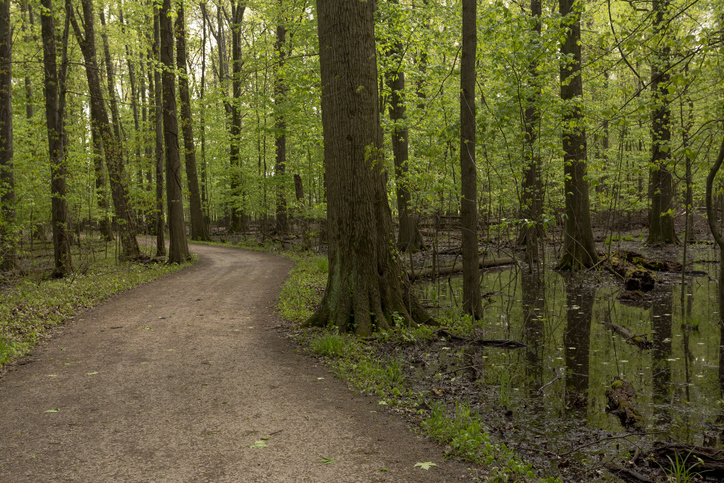Action for Rhode Island’s Forests
March 24, 2024
I am proud to chair the Forest Management Commission and bring some of our rural issues to Capitol Hill. In addition to advocating for comprehensive forest management policies, I am also championing significant investments through the Green Bond fund to further enhance environmental conservation efforts across Rhode Island. This includes allocating $16 million for the Green Bond, with specific allocations of $5 million for farms, $5 million for open space preservation, $3 million for local open space initiatives, and $3 million for forest management.
By leveraging these resources effectively, we can ensure the protection of Rhode Island’s natural landscapes, promote sustainable agriculture, and enhance recreational opportunities for our residents. These investments are essential for preserving our state’s environmental heritage and ensuring a vibrant and resilient future for generations to come.
The Forestry and Forest Parity Act (H7618) is already in place in the majority of states, including most of New England. This underscores the widespread recognition of the that proper forest management is critical to responsible conservation.
Forest management involves planning, identifying problems specific to that forest, and outlining the steps necessary to bring that forest back to health. Just like in a garden, where you may plant three seeds in a single hole and later thin seedlings so one healthy plant can thrive, forests benefit from judicious thinning. A well-maintained forest sequesters more carbon than one that is 25% dead trees.
The legislation is specifically designed, through the inclusion of income limits, to prevent exploitation of tax breaks by large commercial logging operations while supporting smaller, sustainable forestry practices. The protection applies to forest landowners with forest management plans.
The urgency of enacting comprehensive forest management policies after so many years of inattention by our state cannot be overstated, especially in light of recent developments. In 2023, Rhode Island experienced its largest forest fire since the 1950s, highlighting the critical need for proactive measures to mitigate wildfire risks, especially in rural towns like mine that have areas of dense forestation. Additionally, the devastating impact of the spongy moth epidemic, which has led to the death of 25% of Rhode Island’s trees, underscores the pressing need for action.
Moreover, it’s important to recognize the challenges faced by the state Department of Environmental Management. With budget constraints and staff cuts — its forestry staff has been slashed 75% since 1990 — DEM operates with limited resources, hindering its ability to engage in proactive forest management. Currently, DEM is only able to address issues in a mere 1% of Rhode Island’s forests, leaving the majority of our woodlands vulnerable to threats.
In light of these challenges, the legislation I am championing, including the allocation of funds for forest and habitat management and the addition of new staff positions to DEM’s Division of Forestry, is aimed at bolstering our state’s capacity to address these critical issues. By working collaboratively with experts and stakeholders, we can develop comprehensive and sustainable forest management strategies that safeguard both our environment and our economy. These additional funds will complement the efforts outlined in the Forestry and Forest Parity Act, providing crucial support for various aspects of environmental stewardship. Furthermore, the allocation of $3 million specifically for forest management will bolster our capacity to address wildfire risks and combat threats such as the spongy moth epidemic.
The Forestry and Forest Parity Act, along with complementary legislation, represents a balanced approach to addressing the complex challenges facing our state’s woodlands, and I am committed to advocating for their passage for the benefit of all Rhode Islanders.
Rep. Megan L. Cotter (D-Dist. 39, Exeter, Richmond, Hopkinton) is chair of the Special Legislative Commission to Evaluate and Provide Recommendations on Proper Forest Management for Fire Prevention.
Categories
Join the Discussion
View CommentsRecent Comments
Leave a Reply
Your support keeps our reporters on the environmental beat.
Reader support is at the core of our nonprofit news model. Together, we can keep the environment in the headlines.
We use cookies to improve your experience and deliver personalized content. View Cookie Settings




Bravo!!!
To bring some clarity to the Forestry and Forest Parity Act (H7618), let us consider the following introductory statements of this bill:
“The general assembly finds and declares:
(1) That maintaining forests is vital to maintain both biodiversity, and ecosystem services, including carbon sequestration in the state;
(2) That forests are more likely to be maintained if they provide economic value;”
The first statement is true and understood by nearly every scientist as the right thing to do in addressing the climate and biodiversity crises. What is reflected in the second statement is the forester’s belief that statement 1 can be achieved by harvesting trees. To support this view the logging industry, with assistance from the US Forest Service, have derived a number of schemes that purportedly will help forests adapt to climate change and support biodiversity. Unfortunately, most of these schemes do far greater harm than good.
A general theme of the forester is that forests can be redesigned to be more resilient to invasive species, insect outbreaks, and natural disturbances, all of which are projected to increase in occurrence with climate change. And apparently, an “accepted” way to address biodiversity loss is creating wildlife habitat by clearcutting forests to support early successional species.
The newest approach is so-called “assisted migration”. As described by a Vermont State forester, “we have to cut down tree species that are projected to decline with climate change to make room for species that are projected to increase.” There is little concern here about the ecological implications of introducing new species into native ecosystems, because the primary goal is to ensure a steady supply stream of lumber and other wood products.
The RI Forest Action Plan, approved by the Forest Service, clearly states that 95% of trees in the state, most of them less than 80 years old, are ready for harvest. And that is what is happening throughout much of the state on private land with the assistance of contract foresters and Federal money. But the most important piece to note about H7618 is providing for the addition of State foresters to conduct forest management (harvest) on State properties.
Unlike private landowners who may need to have their forest harvested in order to pay the taxman, State forests are the property of everyone and should be managed according to the principle of the greatest good. There is not much one individual can do to stem the tide of climate change and biodiversity loss, but collectively they should have faith in their government to do the right thing. The right thing to do in addressing these crises is retaining intact forests and that should be the overarching policy for the people’s forests.
Also, in regards to Representative Cotter’s piece. Beware the hyperbole. The spongy moth is not an epidemic. That term is more appropriately applied to diseases, Covid for example. And it is not new. The spongy moth (Lymantria dispar) is just the new name for the gypsy moth, because ‘’gypsy’ is considered a derogatory term, which has been a problem bug in RI for more than 50 years. It is only new for younger folks who haven’t experienced an outbreak, which recurs about every 10 years or so.
And this statement: “Just like a garden, where you plant three seeds in a single hole and later thin seedlings so one healthy plant can thrive, forests benefit from judicious thinning.” Actually, industrial forests benefit from thinning, in order to achieve a marketable product in the shortest time possible. In regards to natural forests, the gardening analogy is absurd.